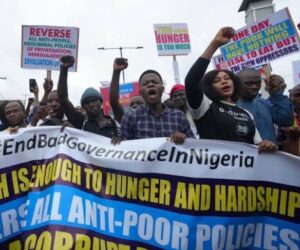Government Takes Steps to Address Planned Independence Day Protests
Government Takes Steps to Address Planned Independence Day Protests

As the government prepares for traditional Independence Day celebrations, certain groups are planning to initiate ongoing protests against what they describe as “bad governance.” This movement, dubbed #FearlessInOctober or EndBadGovernanceProtestInNigeria 2.0, follows a similar series of protests last August, during which thousands demonstrated against government policies in various states.
The previous protests were focused on reversing significant policy changes, including the removal of fuel subsidies, the floating of the naira, and increases in electricity tariffs. Despite appeals from officials for calm, the demonstrations turned violent, resulting in assaults on individuals and property.
To prevent a repeat of the unrest seen in August, the presidency is engaging with protest leaders to seek a peaceful resolution ahead of October 1. Special Adviser Bayo Onanuga emphasized that while the government supports the right to peaceful protest, there are concerns about potential violence.
“The government does not oppose peaceful demonstrations, as it is the citizens’ fundamental right,” he stated. “However, we are concerned about protests escalating into riots, similar to the disturbances we experienced in August and during the 2020 EndSARS protests.”
Security agencies are actively monitoring some of the organizers to ensure that protests do not destabilize the country or become instruments of internal or external forces seeking to undermine the current administration.
Onanuga noted that economic reforms are beginning to show positive results, referencing data from the Central Bank of Nigeria (CBN) and the National Bureau of Statistics (NBS). However, since the August protests, economic conditions have deteriorated further, with petrol prices surpassing N1,000 and the exchange rate exceeding N1,600.
TRENDING SONGS
 NPMA Appeals to Nigerian Government for Compensation After Lagos Market Fire
NPMA Appeals to Nigerian Government for Compensation After Lagos Market Fire
 Rest Every Four Hours, FRSC Issues Safety Guide for Fasting Motorists
Rest Every Four Hours, FRSC Issues Safety Guide for Fasting Motorists
 NNPC Boss Ojulari Bags UK Energy Institute Fellowship
NNPC Boss Ojulari Bags UK Energy Institute Fellowship
 Shock in Anambra: Bride Disappears Moments Before Wedding
Shock in Anambra: Bride Disappears Moments Before Wedding
 Nigerian Woman Returns ₦330 Million Accidentally Credited to Her Account
Nigerian Woman Returns ₦330 Million Accidentally Credited to Her Account
 APC Don Reach Morocco?’ VeryDarkMan Reacts to Seyi Tinubu Poster
APC Don Reach Morocco?’ VeryDarkMan Reacts to Seyi Tinubu Poster
 Bride Breaks Down in Tears as Wedding Meals Were Kept Secretly While Guests Go Home Hungry
Bride Breaks Down in Tears as Wedding Meals Were Kept Secretly While Guests Go Home Hungry
 Odogwu by Day, Robber by Night: How Marriage Joy Turned Into Tragedy
Odogwu by Day, Robber by Night: How Marriage Joy Turned Into Tragedy
 Nigerian Officials Allegedly Pocket N4–6B Weekly Through Smuggling Cartels at Seme–Badagry Border
Nigerian Officials Allegedly Pocket N4–6B Weekly Through Smuggling Cartels at Seme–Badagry Border
 Ahmad Yerima: Naval Officer to Face No Sanctions After Clash with Wike – Matawalle
Ahmad Yerima: Naval Officer to Face No Sanctions After Clash with Wike – Matawalle
Share this post with your friends on ![]()













